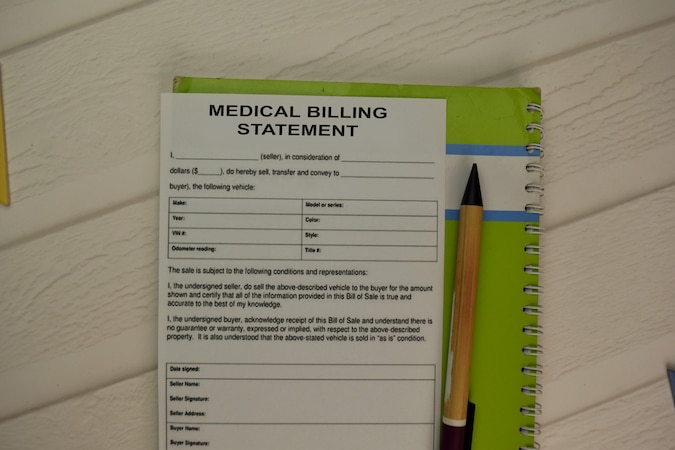
Negotiating Medical Bills to Lower Costs and Manage Debt

Medical bills can be overwhelming, but negotiating with healthcare providers can significantly lower costs and help manage debt. Here’s how you can effectively reduce your healthcare expenses with strategies provided by experts at SelfGood.
Rising healthcare costs can leave individuals and families struggling with unmanageable debt. However, negotiating medical bills is a powerful tool to reduce out-of-pocket expenses. In this guide, we’ll provide expert advice on navigating medical billing, communicating with providers, and using proven negotiation strategies to lower costs and avoid financial stress.
Key Takeaways:
- Understanding your medical bills is the first step toward reducing them.
- Always request an itemized bill to identify errors and clarify charges.
- Use proven negotiation strategies to lower healthcare costs, including requesting discounts or setting up payment plans.
- Professional medical bill advocates can help if you’re overwhelmed.
- Prevent future medical debt by obtaining adequate insurance coverage and practicing preventive healthcare.
Understanding Your Medical Bills

Medical bills can be confusing and filled with unexpected charges. Knowing how to break down and analyze your bill is essential to successful negotiation.
First, always request an itemized bill. This will help you clearly see each charge and identify potential errors. Common billing errors include duplicate charges, incorrect medical codes, and charges for services not rendered. These mistakes can inflate your bill significantly, so it’s crucial to go over each line carefully. If something doesn’t look right, reach out to the billing department for clarification.
Understanding your bill is not just about catching mistakes; it’s also about knowing what each charge represents. From procedures to medications, knowing exactly what you are paying for gives you leverage when you negotiate for a reduction or payment plan.
Why You Should Negotiate Medical Bills
Many people are unaware that negotiating medical bills is even possible, but it’s actually a common practice, especially for large bills or out-of-network charges. Healthcare providers are often open to negotiating because they would rather receive some payment than none at all.
The Negotiation Process
The best time to negotiate medical bills is as soon as you receive them. If you wait too long, your bill may be sent to collections, making negotiation more difficult. Contact the billing department promptly, explain your financial situation, and ask for a reduction.
When to Negotiate
Negotiations can begin at different points. You can negotiate before treatment (especially for elective procedures), during treatment, or after the bill arrives. If you are uninsured or have high out-of-pocket costs, you’re in a strong position to negotiate for discounts or payment plans.
How to Gather Information for Negotiation
To negotiate successfully, gather as much information as possible. Start by requesting an itemized bill, and then compare costs using online tools like the Healthcare Bluebook. This tool helps you understand what other providers in your area are charging for similar services, which gives you leverage when negotiating.
Having accurate information will make it easier to argue your case. For example, if you find that your provider is charging more than the regional average for a particular procedure, you can use that to request a discount. Documentation, such as medical records and financial information, will further strengthen your position.
Communicating Effectively with Healthcare Providers
Once you have gathered all your information, it’s time to initiate the conversation with your healthcare provider. Approach these discussions professionally, and be prepared with specific points you’d like to address.
Preparing for the Call
Before you reach out to the billing department, review your documents carefully. Have all relevant information on hand, including your itemized bill, comparable cost data, and any paperwork related to your financial situation. This will allow you to present a clear, well-supported argument.
Effective Negotiation Strategies
During the conversation, remain polite but assertive. Acknowledge that medical care is expensive, but explain that you’re facing financial hardship. Many healthcare providers have financial assistance programs, so ask if you qualify. Use key phrases such as “I cannot afford this payment” or “I’d like to discuss a discount or payment plan.” Stay persistent and follow up if necessary.
Top Strategies for Negotiating Medical Bills
There are several proven strategies that can help you lower your medical bills. Here’s a breakdown of some of the most effective approaches:
Ask for a Discount
Some healthcare providers offer discounts for paying the full amount upfront. If you’re able to make a lump-sum payment, ask whether you qualify for a reduction. If not, inquire about installment discounts or sliding scale payments based on income.
Explore Payment Plans
Payment plans are an excellent option if a lump-sum payment isn’t feasible. Most healthcare providers are willing to set up payment plans with little or no interest. Ask for a manageable monthly payment amount that won’t strain your budget.
Request Financial Assistance
If you’re facing significant financial hardship, request financial assistance. Many hospitals and clinics have programs that offer discounts or debt forgiveness based on income. Be prepared to submit documentation of your income and expenses to qualify.
Negotiate Based on Income
Explain your financial situation and ask for a reduction in your bill based on your income. Many providers are open to offering discounts to patients in lower-income brackets. Make sure to present all relevant financial documents when requesting income-based adjustments.
When to Consider Medical Bill Advocates
Sometimes, medical bills are too complicated or overwhelming to handle alone. In such cases, hiring a medical bill advocate can be a lifesaver.
What is a Medical Bill Advocate?
A medical bill advocate is a professional who negotiates with healthcare providers on your behalf. They are experts in reviewing medical bills, correcting errors, and negotiating discounts or payment plans. While they typically charge a percentage of what they save you, it’s often worth it, especially for large bills.
When to Use a Medical Bill Advocate
If you have substantial medical debt or feel that your negotiation attempts are going nowhere, a medical bill advocate can step in and handle the situation for you. Organizations like the National Patient Advocate Foundation can connect you with reputable advocates.
Managing Medical Debt After Negotiation

Once you’ve negotiated your bills, managing the remaining debt becomes a priority.
Strategies for Paying Off Medical Debt
One option is to consolidate your medical debt. Consolidation loans often come with lower interest rates and allow you to combine multiple bills into one easy payment. If you have significant debt, look into medical debt forgiveness programs as well.
Dealing with Collection Agencies
If your debt has already been sent to collections, know your rights under the Fair Debt Collection Practices Act. You still have the right to negotiate payment terms or set up a payment plan. Collection agencies prefer to recover at least some of the debt, so they may be more flexible than you think.
How to Prevent Future Medical Debt
Preventing future medical debt requires careful planning and proactive healthcare management.
Getting Health Insurance
Ensure you have adequate health insurance that covers both routine and emergency medical care. This will reduce the likelihood of facing large out-of-pocket expenses in the future.
Preventive Health Measures
Taking advantage of preventive healthcare can also reduce long-term costs. Regular check-ups, screenings, and vaccinations help catch potential health issues early, often before they become costly emergencies.
Final Thoughts
Negotiating medical bills can be challenging, but with the right strategies, it’s possible to lower costs and manage debt effectively. By understanding your medical bills, gathering information, and communicating effectively with providers, you can take control of your healthcare expenses. If you’re feeling overwhelmed, don’t hesitate to seek professional help from a medical bill advocate. With persistence and preparation, you can protect your financial health while receiving the care you need.
Frequently Asked Questions
Can I negotiate medical bills after insurance has paid?
Yes, you can still negotiate the remaining balance after insurance has paid. You can also review and dispute any charges you believe were incorrect.
How long does the negotiation process take?
The process can vary but generally takes anywhere from a few days to a few weeks. It depends on the complexity of your case and how responsive the healthcare provider is.
What if my healthcare provider refuses to negotiate?
If your provider refuses to negotiate, consider escalating your case to a higher authority within the billing department or seeking assistance from a medical bill advocate.
Sources:
- Federal Trade Commission. (n.d.). Fair Debt Collection Practices Act. ftc.gov 2 Healthcare Bluebook. (n.d.). Compare healthcare costs. healthcarebluebook.com 3 National Patient Advocate Foundation. (n.d.). Medical Bill Advocate. patientadvocate.org




